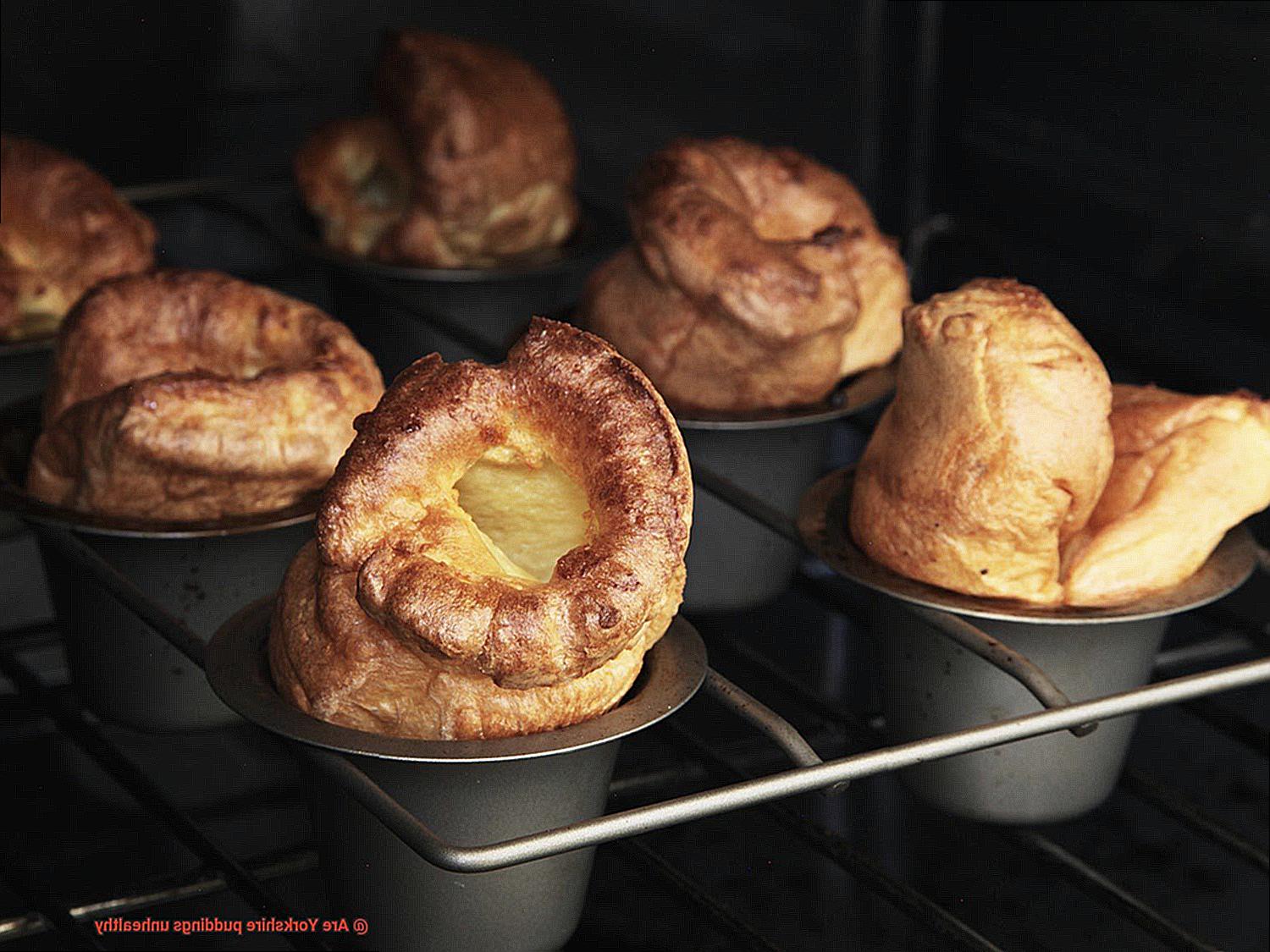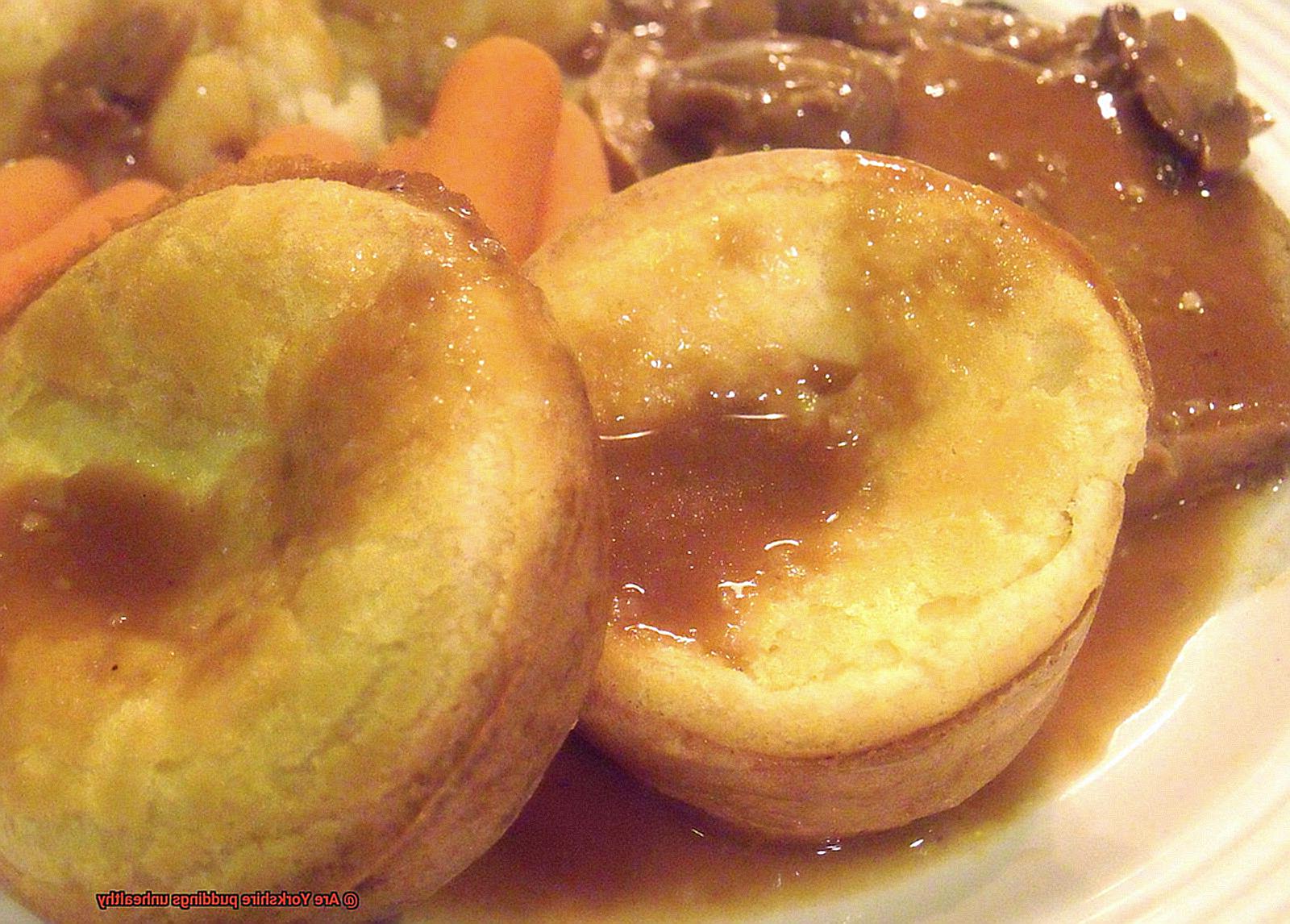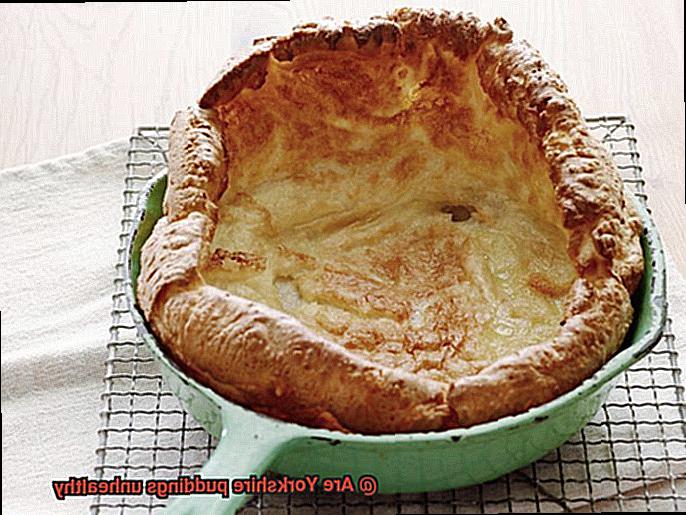Are Yorkshire puddings unhealthy?
Yorkshire puddings – those delightful British delights that are crispy, fluffy, and oh-so mouth-watering. Whether you enjoy them as a sidekick to a glorious roast dinner or smothered in luscious gravy, these golden goodies are a must-have on many plates. But here’s the burning question: do they actually deserve their unhealthy reputation?
Get ready for a culinary adventure as we dive into the truth behind the allure of this classic dish. We’ll explore their nutritional profile, shining a light on both the potential health benefits and drawbacks. Don’t worry though – we won’t let the seriousness of it all take away from our love for these puffed wonders. Get ready for an enticing blend of fun facts and eye-opening insights as we unravel the mystery of Yorkshire puddings together.
Nutritional Content of Yorkshire Puddings
Contents
- 1 Nutritional Content of Yorkshire Puddings
- 2 Calories in Yorkshire Puddings
- 3 Health Benefits of Eating Yorkshire Puddings
- 4 Potential Health Risks of Eating Too Many Yorkshire Puddings
- 5 How to Make Yorkies Healthier
- 6 Alternatives to Traditional Yorkshire Puddings
- 7 Should French Bulldogs Eat Yorkshire Puddings?
- 8 Tips for Feeding French Bulldogs Healthy Meals
- 9 Conclusion
Bonjour, mes amis. Today, we’re going to talk about a traditional British dish that might make your taste buds wag – Yorkshire puddings. These golden, crispy delights are often served alongside roast beef or other meat dishes. But as responsible French Bulldog owners, we have to consider their nutritional content. Are Yorkshire puddings a treat we can share with our furry friends? Let’s find out.
The Good:
Carbohydrates for Energy:
Yorkshire puddings are made with flour, which provides carbohydrates – the body’s main source of energy. While the flour used is typically refined and lacks the nutrients found in whole grain flour, it still gives a boost to our active Frenchies.
Protein from Eggs:

Eggs are another key ingredient in Yorkshire puddings. They are a great source of protein and contain essential amino acids that support muscle growth and repair. Plus, they provide important nutrients like vitamin B12 and selenium.
The Not-So-Good:
High in Fat:
Yorkshire puddings are traditionally cooked in oil or fat, which gives them their crispy texture. This means they can be quite high in fat content. Too much fat can lead to weight gain and health problems for our furry friends.
Calories Add Up:
While one medium-sized Yorkshire pudding contains around 140-180 calories, it’s important to consider portion sizes. It’s easy to gobble up multiple puddings, which quickly adds up the calorie intake.
Tips for Healthier Yorkshire Puddings:
Choose Whole Grain Flour:
Opt for whole grain flour instead of white flour to increase the fiber content and add more nutrients to the puddings.
Go Easy on the Fat:
Use vegetable oils or lower-fat alternatives when making Yorkshire puddings to reduce the overall fat content.
Portion Control:
Remember, moderation is key. Limit the number of Yorkshire puddings you serve your French Bulldog to avoid excessive calorie intake.
Calories in Yorkshire Puddings
Yorkshire puddings are a classic British dish that can be enjoyed as a side or as the star of the show. Whether you’re a fan of these golden delights or have a French bulldog who can’t resist sneaking a bite, it’s important to understand the calorie content of Yorkshire puddings. Here’s what you need to know:
Ingredients Matter:
The basic Yorkshire pudding recipe calls for flour, eggs, and milk. These ingredients contribute to the overall calorie count. However, variations in the ingredients can affect the calorie content. For example, using whole grain flour instead of white flour adds more fiber but also slightly increases the calorie count.
Size and Portions:
The size of your Yorkshire pudding plays a significant role in its calorie content. A standard homemade Yorkshire pudding contains around 150-200 calories per serving. However, larger portions or oversized Yorkshire puddings may have more calories.
Cooking Methods:
The cooking method used can impact the calorie content of Yorkshire puddings. Traditionally, Yorkshire puddings are cooked in fat or oil, which adds extra calories. However, you can reduce the calorie count by using cooking sprays or non-stick pans instead.
Added Fats:
While not essential, some recipes call for additional fats like butter or oil in the batter. These fats contribute to the overall calorie content of Yorkshire puddings. To cut back on calories, consider reducing the amount of fat used or opting for lower-fat alternatives.
Commercially Produced Yorkshire Puddings:
If you’re purchasing Yorkshire puddings from a store or restaurant, keep in mind that their calorie count may differ from homemade versions. Commercially produced Yorkshire puddings may contain added ingredients or larger portion sizes, resulting in slightly higher calorie counts.
Serving Suggestions:
The calorie count of a Yorkshire pudding can be influenced by what it’s served with. Pairing it with a rich gravy or fatty meat will increase the overall calorie intake. To keep calories in check, consider serving Yorkshire puddings with lean meats and lighter sauces.
Portion Control:
Portion control is crucial when considering the calorie content of Yorkshire puddings. Enjoying them as part of a balanced meal and watching portion sizes can help manage overall calorie intake.
Health Benefits of Eating Yorkshire Puddings
Today, we’re diving into the world of Yorkshire puddings and uncovering their surprising health benefits. Mais oui, you read that right. These golden delights can actually be a nutritious addition to your pup’s diet when enjoyed in moderation. Let’s dig in.
A Batter Full of Goodness:
The base of Yorkshire puddings is a simple yet powerful combination of flour, eggs, and milk. Each ingredient brings its own nutritional benefits to the table.
- Flour: This carbohydrate-rich ingredient provides your pup with much-needed energy. It fuels their playful antics and supports overall health and vitality.
- Eggs: Packed with protein, vitamins, and minerals, eggs help build and repair tissues while supporting various bodily functions. They’re like little powerhouses for your furry companion.
- Milk: An excellent source of calcium, milk promotes strong bones and teeth for your French bulldog. It also contains other essential nutrients like vitamin D, potassium, and phosphorus that contribute to their overall wellbeing.
Baked to Perfection:

Unlike other fried foods, Yorkshire puddings are typically baked, making them a healthier alternative. Baking reduces the amount of added fat and calories in the final product. Ooh la la. But wait, there’s more.
Versatile Addition to Meals:
Yorkshire puddings can be a versatile addition to a well-balanced meal for your pup. Serve them alongside lean meats or fish, colorful vegetables, and a side salad to create a balanced plate that provides a mix of protein, carbohydrates, healthy fats, fiber, and various vitamins and minerals. C’est magnifique.
Conclusion:
Voilà. You now have a paw-some understanding of the surprising health benefits of Yorkshire puddings for your French bulldog. Remember, moderation is key. Enjoy these golden delights as part of a balanced diet and watch your pup wag with delight. Bon appétit to you and your furry friend.
Potential Health Risks of Eating Too Many Yorkshire Puddings
Let’s dive into the details and learn why moderation is key.
- Pudgy Pup Alert: Yorkshire puddings are packed with calories, thanks to their flour, eggs, and milk content. Feeding your French bulldog too many can lead to weight gain and increase the risk of obesity. Just like humans, our furry friends need to watch their waistlines too.
- Fatty Boom Boom: These yummy puddings are often cooked in oil or beef drippings, adding to their calorie and fat content. Excessive intake of saturated fats can raise cholesterol levels and increase the risk of heart disease. No one wants a pup with clogged arteries, right?
- Salty Surprise: Yorkshire puddings can be a sneaky source of sodium, especially when served with salty accompaniments like gravy. A high-sodium diet can contribute to high blood pressure and put your pup’s cardiovascular health at risk. Let’s keep those paws pumping strong.
- Nutrient Deficiency: While Yorkshire puddings may make our taste buds do a happy dance, they lack essential nutrients like fiber, vitamins, and minerals that are crucial for our Frenchies’ overall health and well-being. Let’s make sure they get a balanced diet filled with all the good stuff.
- Tummy Troubles: The rich and heavy nature of Yorkshire puddings can cause digestive issues for our furry friends. Eating too many can leave them feeling bloated, uncomfortable, and suffering from indigestion. Let’s keep those bellies happy.
- Sugar Rollercoaster: The refined flour used in Yorkshire puddings can cause a rapid rise in blood sugar levels for both humans and dogs alike. This rollercoaster can leave our pups feeling tired and sluggish after the initial energy boost. Let’s keep their energy levels steady.
- Allergy Alert: Some Frenchies may have allergies or intolerances to common ingredients found in Yorkshire puddings, such as wheat or dairy. Feeding them excessive amounts of these puddings can worsen their conditions and lead to unpleasant symptoms. Let’s keep those sneezes and tummy rumbles at bay.
- Portion Control is Key: The delicious taste and comforting texture of Yorkshire puddings can make it easy for both humans and dogs to overindulge. But remember, excessive consumption can contribute to weight gain and associated health risks. Let’s practice portion control for our furry friends too.
Now, don’t panic. Enjoying Yorkshire puddings occasionally as part of a balanced diet is unlikely to pose significant health risks for your French bulldog. Just make sure to offer them in moderation alongside other nutritious foods. After all, a happy pup is a healthy pup.
How to Make Yorkies Healthier

Yorkies are adorable and lovable little dogs that bring joy to our lives. As Yorkie owners, it’s our responsibility to ensure they live a healthy and fulfilling life. In this blog post, we will explore five key areas to focus on: diet, exercise, grooming, dental care, and mental stimulation. By following these tips, you can help your Yorkie thrive and be the happiest, healthiest pup on the block.
Nourishing Diet:
Start by feeding your Yorkie a balanced and nutritious diet. Look for high-quality dog food that contains real meat as the main ingredient. Avoid fillers and artificial ingredients that can harm their delicate systems. Also, consider portion control to prevent overeating and obesity.
Daily Exercise:
Yorkies may be small in size, but they have plenty of energy to burn. Regular exercise is crucial for their physical and mental well-being. Take them for daily walks or play fetch in the backyard. Engage in interactive play sessions to keep them active and entertained.
Grooming Rituals:
Maintaining a regular grooming routine is essential for your Yorkie’s health. Their long silky coats require regular brushing to prevent tangles and matting. Schedule regular baths, ear cleaning, and nail trimming to keep them clean and comfortable.
Dental Care:
Yorkies are prone to dental issues, so proper dental care is vital. Brush their teeth regularly with a dog-specific toothbrush and toothpaste to prevent plaque buildup and gum disease. Provide dental chews or toys designed to promote oral health.
Mental Stimulation:
Yorkies are intelligent dogs that need mental stimulation to stay happy. Engage them in puzzle toys, teach them tricks, or enroll them in obedience classes. Spending quality time with your Yorkie will strengthen your bond and keep their minds sharp.
Alternatives to Traditional Yorkshire Puddings
Yorkshire puddings are a beloved British dish, but their high calorie and fat content can make them less than ideal for those looking for a healthier option. Luckily, there are several alternatives that can still satisfy your cravings while being better for your health. Let’s explore some delicious and healthier alternatives to traditional Yorkshire puddings.
Whole Wheat Flour:
Swap out regular flour for whole wheat flour to add more fiber and nutrients to your Yorkshire puddings. This alternative not only boosts the nutritional value but also adds a slightly nutty flavor to the final dish.
Egg Whites:
To reduce the fat content, use a combination of eggs and egg whites instead of whole eggs. This modification still provides structure to the pudding while cutting down on unnecessary fats.
Low-Fat or Skim Milk:
Replace full-fat milk with low-fat or skim milk to further reduce the calorie and fat content of your Yorkshire puddings. This simple swap doesn’t compromise on taste but helps make your dish healthier.
Gluten-Free Options:
If you’re following a gluten-free diet, there are alternatives for you too. Try using gluten-free flour blends or almond flour as a substitution. These options will ensure that everyone can enjoy Yorkshire puddings, regardless of dietary restrictions.
Mini Yorkshire Puddings:
Portion control is key when it comes to healthy eating. Making mini Yorkshire puddings instead of large ones helps with managing portion sizes and reducing overall calorie intake.
Vegetable Infusion:
Add extra nutrients and flavors by incorporating grated zucchini or carrots into your batter. These vegetables not only enhance the taste but also provide additional health benefits.
Should French Bulldogs Eat Yorkshire Puddings?
French Bulldogs are beloved pets known for their friendly nature and unique appearance. As responsible pet owners, it is important to provide them with a balanced and nutritious diet. Yorkshire puddings, a traditional British dish, may be tempting to share with your furry friend, but it’s essential to consider whether they are safe for French Bulldogs.
Nutritional Considerations:
Yorkshire puddings are primarily made from flour, eggs, and milk. These ingredients offer some nutritional benefits. Flour provides carbohydrates for energy, eggs are rich in protein for muscle development and repair, and milk contains calcium for bone health. However, it is crucial to consider the overall diet of a French Bulldog before introducing Yorkshire puddings.
Potential Health Risks:
French Bulldogs have specific dietary needs, and certain foods can pose potential health risks. Yorkshire puddings are often high in fat and salt, which can lead to obesity and cardiovascular problems in dogs. Additionally, French Bulldogs are prone to allergies and sensitivities, and ingredients in Yorkshire puddings like wheat or dairy may trigger adverse reactions.
Portion Control:
Even if Yorkshire puddings are not considered unhealthy for French Bulldogs, portion control is crucial. Feeding excessive amounts of Yorkshire puddings can lead to weight gain and digestive issues. Moderation is key when introducing any new food into your dog’s diet.
Alternatives:
Instead of feeding Yorkshire puddings directly to French Bulldogs, there are alternative options that can still satisfy their taste buds. Homemade treats using healthier ingredients like whole wheat flour or gluten-free alternatives can be a safer choice. Consulting with a veterinarian or a canine nutritionist can provide further guidance on suitable alternatives.
While Yorkshire puddings may not necessarily be toxic or harmful to French Bulldogs, they should be consumed sparingly due to their high-fat and high-salt content. Prioritizing a balanced and nutritious diet is essential for the overall health and well-being of French Bulldogs.
It is always recommended to consult with a veterinarian or a professional in canine nutrition before introducing any new foods into your dog’s diet.
Tips for Feeding French Bulldogs Healthy Meals
French Bulldogs are adorable and lovable pets that bring joy to our lives. Just like any other dog, they have specific dietary needs that require careful attention. In this guide, we will explore some essential tips for feeding French Bulldogs healthy meals to ensure their overall health and well-being.
Choose High-Quality Dog Food:
When it comes to feeding your French Bulldog, opt for high-quality dog food specifically formulated for their breed. Look for options that contain high-quality protein sources like chicken or fish, as well as healthy fats and carbohydrates. These nutrients are essential for their growth, energy levels, and muscle development.
Avoid Table Scraps and Human Food:
As tempting as it may be to share your meals with your furry friend, it is best to avoid feeding them table scraps or human food. These can lead to weight gain, digestive issues, and even toxic reactions in some cases. Keep foods like chocolate, onions, and grapes out of their reach as they can be harmful or toxic to dogs.
Consider Specialized Diets if Needed:
French Bulldogs are prone to allergies and sensitivities, so it’s important to be aware of any specific dietary restrictions they may have. If your French Bulldog requires a specialized diet due to allergies or other health conditions, consult with your veterinarian to determine the best options available.
Portion Control is Key:
French Bulldogs have a tendency to overeat, which can lead to obesity and related health problems. Follow the feeding guidelines on the dog food packaging and monitor your dog’s weight regularly to ensure they are maintaining a healthy body condition. Stick to regular feeding times and avoid free-feeding.
Provide Fresh Water Always:
Hydration is crucial for your French Bulldog’s overall health. Make sure they have access to fresh water at all times. Dehydration can lead to various health issues, so it’s important to check their water bowl regularly and refill as needed.
Incorporate Fruits and Vegetables:
Consider adding some fresh fruits and vegetables to your French Bulldog’s diet as treats or additions to their meals. Certain fruits and vegetables, like apples, blueberries, carrots, and green beans, can provide additional vitamins and minerals while adding variety to their diet. However, avoid toxic foods like grapes, raisins, onions, and garlic.
Conclusion
In conclusion, it is safe to say that Yorkshire puddings can be enjoyed as part of a balanced diet without causing significant harm to your health.
While they may not be the epitome of nutritional perfection, their occasional indulgence won’t derail your well-being. So go ahead and savor the crispy, golden goodness of a Yorkshire pudding with confidence.
Your taste buds will thank you, and your waistline will remain intact.




